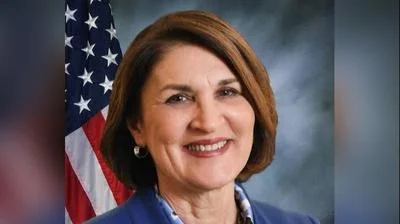Congresswoman Nikki Budzinski | Congresswoman Nikki Budzinski Official U.S. House Headshot
Congresswoman Nikki Budzinski | Congresswoman Nikki Budzinski Official U.S. House Headshot
WASHINGTON, D.C. — On June 21, Congresswoman Nikki Budzinski (IL-13) introduced the Rebuild Rural America Act — comprehensive legislation to address the challenges specific to rural America and make it easier for these communities to access federal funding on the path to economic revitalization. The bill would invest $50 billion in rural economic development, infrastructure, schools, hospitals and small businesses nationwide. U.S. Senators Kirsten Gillibrand (NY), Tina Smith (MN) and Dick Durbin (IL) have introduced companion legislation in the Senate.
“From limited access to health care and high-speed internet to aging infrastructure and a rapidly changing economy, rural communities in Central and Southern Illinois are facing an onslaught of generational challenges,” said Congresswoman Budzinski. “I came to Congress to fight for investment and support for our smallest cities and towns to help them survive and thrive in the 21st century — and I’m proud to introduce bold legislation to do just that. By investing in economic development and rethinking how the federal government provides support to rural communities, the Rebuild Rural America Act ensures that vital funding and resources reach rural communities in need.”
The Rebuild Rural America Act takes a comprehensive approach to position rural regions across the country for success in a 21st century economy. By providing investments that complement local efforts and helping make local economies more resilient, the legislation will help to ensure that rural communities are places where anyone can live, work, raise a family and retire. The bill establishes a new national partnership model that offers flexible, responsive, long-term investment and assistance for local rural development efforts. Specifically, the Rebuild Rural America Act would:
- Establish a Rural Future Partnership Fund that would create a $50 billion block grant program for long-term rural economic development projects, including investments in child care centers, public schools, libraries, community centers, health care providers, workforce development programs, emergency preparedness programs, main street revitalization programs and water and sewer facilities, among others. In contrast with existing funding opportunities, which often require arduous applications that recipients must reapply through each year, the fund would provide grantees with 5 years of guaranteed funding. This streamlined process would allow communities to make longer-term investments and would ease administrative burdens on local governments.
- Make it easier for rural communities to access federal funds and other resources by establishing a USDA Rural Innovation and Partnership Administration. This administration would work directly with local leaders to provide information on available federal resources, technical assistance and cutting-edge data to help them craft and implement rural revitalization plans to make government helpful, not a hassle.
- Fight population loss from rural areas by launching the Rural Future Corps, a program that would place AmeriCorps Fellows in rural communities and help these communities expand critical services like childcare, health, nutrition assistance, education and job training. The program would also work to retain members in rural communities after their year of service.
- Empower local leaders, who know their communities best, to drive regional economic development through a new suite of national capacity and training programs to connect the expertise of national technical assistance providers with rural regions.
The Rebuild Rural America Act has been endorsed by Rural Organizing, the Rural Community Assistance Partnership, the Federation of Appalachian Housing Enterprises, the Housing Assistance Council, the Local Initiatives Support Corporation, People’s Action, the Rural Community Assistance Partnership, Local Progress, Visibility Outreach Touch Engage South Arkansas (VOTE SoAR), the Alaska Public Interest Research Group, Appalachian Voices, the Rural Democracy Initiative, Progress North, the Region Five Development Commission, Rural Community Solutions, the Rural Voices for Conservation Coalition, Cure River, the Rural Coalition, the U.S. Federation of Worker Cooperatives, the Appalachian Citizens Law Center, the Rural Community College Alliance and Small Business Majority.
“Rural communities are special places, but they don’t always get a fair shot at the resources they need to thrive. For years, we’ve been told to be present and listen to people in small towns and rural communities. We have heard that folks need reliable and affordable daycare, transportation solutions, and affordable rent and utilities so they can afford to work in the rural places they love. Now it’s time to deliver on that listening. By making sure rural communities have access to federal resources and by prioritizing locally-led solutions, rural places will continue to be cradles of innovation and connection, but will also be better-equipped to foster healthy, connected, and vibrant communities. That’s why the Rebuild Rural America Act is so important – because it ensures rural communities get investments without having to compete for their own tax dollars, it prioritizes communities which have seen the worst disinvestment over time, and it leans on local leaders to create the solutions which will work best. Rural Organizing is excited to see such a bold action to help rural communities get their fair share through the Rebuild Rural America Act,” said Matt Hildreth, Executive Director of Rural Organizing.
“RCAP fully supports the Rebuild Rural America Act and the dedicated, multi-year funding it will provide for rural communities. RCAP works with communities and partners across the country to advocate for and generate economic opportunities for rural areas, as well as provide critical capacity building and technical assistance. In 2022, RCAP helped more than 3.5 million rural and tribal residents in more than 1,650 of the smallest, most distressed communities leverage nearly $700 million in infrastructure funds, and we look forward to this legislation enabling us to serve more rural Americans,” said Olga Morales-Pate, CEO of the Rural Community Assistance Partnership.
“The Rebuild Rural America Act is designed to supply the exact resources and supports that rural communities need to interrupt cycles of economic decline and population loss. Not only is it a very real investment of capital in often-overlooked parts of our nation, but it also provides those places with access to capital in ways that no other federal program ever has. This bill has been written from the start with the hardest-to-serve rural places in mind,” said Joshua Stewart, Director of Federal Policy Advocacy at the Federation of Appalachian Housing Enterprises.
“There has never been a better time to invest in the rural communities of America as we seek to meet the challenges of climate, biodiversity, wildfire, and landscape resilience. The Rebuild Rural America Act will help to strengthen the stewardship economies within rural communities through community-based collaborative capacity building. We are grateful for the leadership of Rep. Budzinski, Rep. Spanberger, Sen. Gillibrand, Sen. Smith and Sen. Durbin for putting forth policy designed to put tools and investments directly in the hands of local rural leaders,” said Laurel Harkness, Coalition Director at the Rural Voices for Conservation Coalition.
Full text of the bill can be found here.
Original source can be found here.






 Alerts Sign-up
Alerts Sign-up